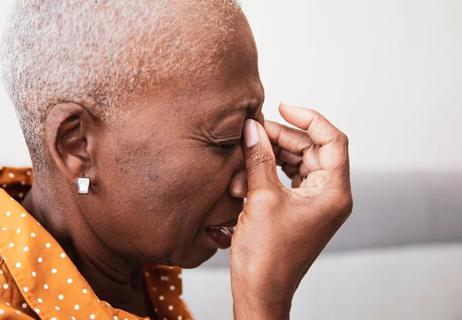How to deal with this common condition

Your head feels foggy and is full of congestion. You can’t taste or smell your favorite meal. And on top of that, you have postnasal drip. The worst part of it all? You can’t tell if these symptoms are synonymous with your yearly cold or allergies.
Advertisement
Cleveland Clinic is a non-profit academic medical center. Advertising on our site helps support our mission. We do not endorse non-Cleveland Clinic products or services. Policy
But these symptoms also could mean you have sinusitis, says ear, nose and throat specialist Michael S. Benninger, MD. Dealing with this common condition could take some getting used to, but Dr. Benninger offers some tips about how sinusitis is diagnosed — and how to prevent it in the first place.
Because the symptoms of sinusitis overlap with other conditions, seeing a doctor will help narrow down a diagnosis.
Write down all of your symptoms so you come prepared for your appointment. Your doctor will go over your medical history with you to further understand if you have a history of allergies or any past conditions.
Acute sinusitis (rhinosinusitis) is inflammation of the tissue lining your nose and sinuses and is often caused by a virus or bacterial infection. On top of the stuffy head, sneezing and runny nose, you may also have pain in your face and teeth and discolored drainage.
“Although it is worthwhile to have a doctor look in your nose to help determine the problem, often times a reasonable diagnosis can be made based on symptoms and via a virtual visit,” says Dr. Benninger.
Sometimes, your sinus infection can last much longer and could last more than 12 weeks. This is called chronic sinusitis and in severe cases, you may need surgery to help alleviate the pain. Your symptoms may include pressure around your nose, eyes and forehead, thick yellow or green discharge from your nose or postnasal drip.
Advertisement
Acute sinusitis typically goes away on its own in seven to 10 days. If it lasts longer, your doctor may prescribe antibiotics. Your doctor may also perform an allergy test if they suspect your sinusitis is a result of allergies.
Chronic sinusitis is different and treating it requires more time and patience. A combination of medications — including nasal steroid sprays, oral steroids and mucus-thinning drugs — may help ease symptoms. Since it’s not usually caused by bacterial infection, antibiotics aren’t the go-to treatment.
To diagnose this common condition, your doctor may use an endoscope to see inside your nose or they may order a CT scan or MRI to see if you have a deviated nasal septum or growths (polyps).
Decongestant sprays and drops may relieve your symptoms for a short time, but sometimes they do more harm than good.
“Use them sparingly or avoid them altogether because of the danger of rebound congestion,” warns Dr. Benninger. “Rebound congestion is congestion that comes back after you stop taking them and leaves you with a new problem to treat.”
Decongestant sprays not working as well as you hoped? You may also benefit from nasal irrigation like a Neti pot, which rinses pollutants out of nasal tissue. Fill this small teapot-shaped kettle with fluid, tilt your head and insert the sprout into each nostril. This helps clean out your nasal passages.
Make sure you pour filtered water into your Neti pot and always clean and disinfect it after each use to avoid infection.
Over the counter intranasal steroids like fluticasone can be helpful for allergies, reduce the intensity of symptoms of a cold and may be effective in chronic sinusitis.
If the treatments above are not effective, or if nasal polyps develop and block sinus drainage, surgery may be necessary. There’s good news: It’s usually an outpatient procedure. Surgery also may help hone a diagnosis in chronic cases and if you have a deviated nasal septum, which can cause breathing and drainage problems.
Washing your hands frequently to avoid the germs that lead to sinusitis and avoiding allergens like pollen, dust and animal dander can help prevent this condition. Not only that, but eating a well-balanced diet, exercising frequently and quitting smoking is important to boost your immune system.
“These steps won’t cure sinusitis, but they can help you avoid it,” says Dr. Benninger.
Advertisement
Learn more about our editorial process.
Advertisement

Give it seven to 10 days, but if your symptoms linger or get worse, it’s time to see a healthcare provider

A gentle touch in all the right places may help drain your sinuses

From nasal sprays to neti pots, these home remedies can help relieve your symptoms

There's hope for chronic nasal and sinus problems that don't put you in the mood

Some things you can do to ease symptoms

Most antihistamines, like Zyrtec, are OK, but avoid decongestants for at least the first trimester

Allergies, indigestion and the effects of gravity can all mess with your nose at night

Open the windows, keep a clean house and consider putting in preventive features like carbon monoxide detectors

Wearing a scarf, adjusting your outdoor activities and following your asthma treatment plan can help limit breathing problems

Your diet in the weeks, days and hours ahead of your race can power you to the finish line

When someone guilt trips you, they’re using emotionally manipulative behavior to try to get you to act a certain way